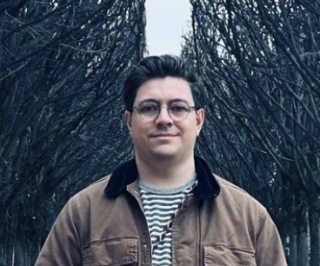Chris completed a BSc in Biological Sciences and an MA in Public Policy and Public Management at the University of East Anglia (UEA), before starting his PhD at STEaPP in 2022.
 How did you come to realise you wanted to study for a PhD?
How did you come to realise you wanted to study for a PhD?

I have had a burgeoning desire to do a PhD since i graduated from my Masters and knew I wanted to do something that intertwined both my biology and policy background. I also was excited by the prospect of creating novel research and outputs in novel areas that I hope will have a real-world impact. After the Covid pandemic I decided to bite the bullet and go for it!
Why did you choose to undertake a PhD at UCL STEaPP?
STEaPP is one of a kind in its mix of interdisciplinary research and academics, and its mission to enable tangible real world impact through policy resonated with me. After speaking with my now supervisor Prof. Mugwagwa, it was clear that STEaPP really pushes its PhD students to become fully rounded researchers and the value of professional experience, including balancing my studies with my day job.
What is the focus of your PhD?
My PhD looks to investigate Vietnam’s response to dengue fever and how social and cultural norms have impacted the development and delivery of health-related policy, as well as how future health policies be developed to incorporate social and cultural norms in this context for greater impact and success.
What has been the highlight of your PhD so far?
Too much choice, but would be either contributing to chapters in Professor Mugwagwa's upcoming book on global health and innovation, having the opportunity to teach as part of the MPA Program, or acting as a judge on this year’s How to Change the World program in UCL Engineering. These have all been completely new challenges for me which have been daunting, but invaluable experiences.
How would you describe the community at STEaPP?
Welcoming, supportive and knowledgeable. Despite colleagues different research backgrounds and interests, there is a unity around working towards a common goal and supporting each other in our research.
What are the facilities like at STEaPP, and the UCL campus generally?
UCL is a university with world-class facilities and experts that means students are not limited to follow their research aims, regardless of ambition. As a part-time student, it is great to have constant access to resources and facilities digitally to give me flexibility in my work.
How have you found the support available at STEaPP, and the wider university?
I have found STEaPP and UCL to already be incredibly supportive of my studies, particularly as a part-time student balancing my work and PhD. Support of all kinds is clearly signposted and accessible be it academic or personal, and I feel that I can raise issues or concerns freely within STEaPP if they arise.
What are your future plans/aspirations?
I currently work alongside my PhD as a Science and Innovation Adviser in UK Government and upon completing my PhD, I am hoping to continue balancing my work with my academic research, taking the learnings from my research and applying these into action to support science and research in Government and international development. This is both because of how much I enjoy this balancing act, but also because of the tangible value of sitting across both the academic and practical sides of science and policy.
Do you have a mentor/role model who has inspired you?
My supervisor Professor Julius Mugwagwa has been a fervent supporter of my research and working closely with him has been enjoyable and eye opening to observe and experience the realities of the academic world. Having come from similar academic backgrounds and with aligned research interests, it has been a pleasure to have contributed even in some small way to his research and taking these learnings into my own PhD research and career.
What advice would you give to future PhD students?
The experiences outside of your thesis research are just as important for your development and growth. Finding those opportunities to add value and work on activities and projects outside your own research area, be it via writing, teaching or engagement, will help you develop your own research style and understand what the whole picture of academia looks like.
 Close
Close

